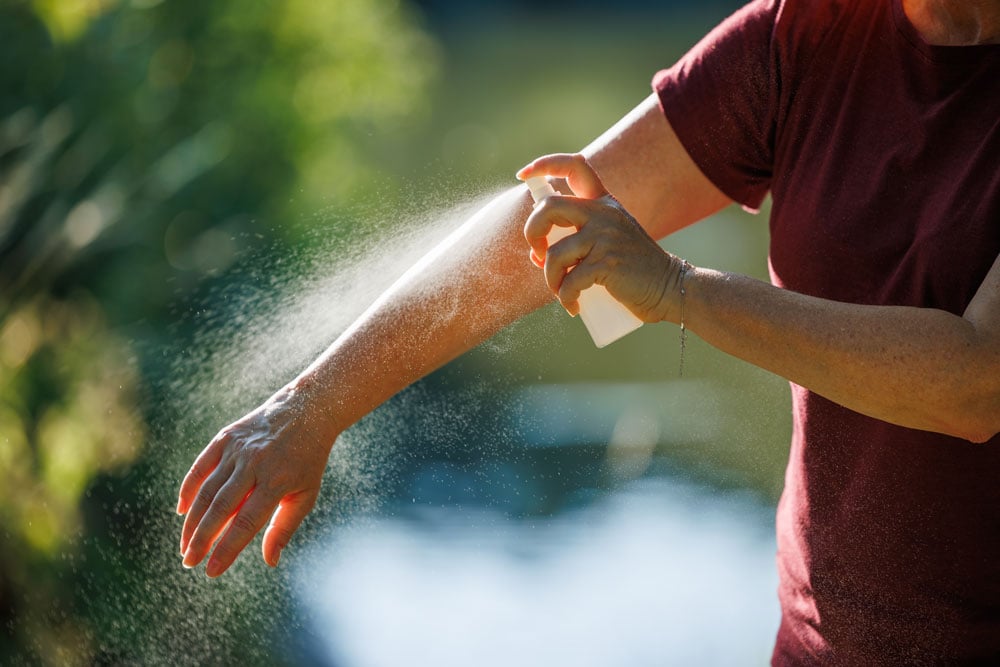How to Stock Your Summer Medicine Cabinet
A local pharmacist provides some practical tips and product recommendations for everything from blisters to bug bites.
When it comes to a summer medicine cabinet, sunscreen is just the beginning.
Maura Jeffries, a pharmacist with UPMC Presbyterian Prescription Shop, says sunscreen is the first thing that comes to mind, but summer also means bugs, bee stings, scrapes and bruises and poison ivy.
“When I was an intern in a community setting … we got so many questions about poison ivy, poison sumac, poison oak,” she says.
The plants’ leaves have oils that transfer from the plant to skin, which causes a reaction of bumps, blisters and/or swelling. She recommends a bar soap called IVY-Dry, which helps to remove the leaves/ oils from your skin, and calamine lotion can be applied to soothe your skin afterward.
“You have to get rid of the oils. You have to wash anything it came in contact with in hot water, your sheets, your clothes, anything you touched,” she says.
As far as bug bites, mosquitos are the first thing that comes to mind, she says. If you’re hiking, you may want to apply a DEET-based repellent to ward them off.
“You would just want to put it on any exposed skin,” she says.
Most common bug bites are self-limiting, meaning they heal on their own, but you could use a hydrocortisone cream to soothe any itching.
“I prefer cream over ointment because creams are going to absorb faster,” she says.
For bee stings, anyone who is allergic should have an EpiPen on hand and an antihistamine like Benadryl.
“Antihistamines have so many uses, not just allergies,” she says. “Antihistamines are always a good thing to have in your medicine cabinet.”
Kids may be more prone to scrapes and bruises in the summer, and Jeffries says using Neosporin is not recommended since it’s an antibiotic and you don’t want to build up antibiotic resistance.
For a small scrape, use Vaseline and a Band-Aid to keep the skin moist and make sure nothing gets into the scrape. For an open wound, she recommends Bacitracin.
She also says blisters can be common in the summer as people engage in more exercise and may be wearing new shoes.
“Blisters are your body’s way of protecting itself, so you should never pop a blister,” she says. She recommends a Band-Aid and potentially a hydrocolloid patch to draw out the fluid.
For swimmer’s ear, she recommends Debrox to remove any fluid, since swimmer’s ear can turn into an infection.
“You are never supposed to put a Q-tip in your ear,” she says. “Your ear canal is a very sensitive part of your body. It can be punctured super easily.”
“As far as symptoms go, if you’re feeling pressure and pain, if those continue, those are something to seek a doctor’s care for,” she says. “Any kind of fluid will have bacteria in it, and bacteria can fester causing an infection in the ear canal and then you would need an antibiotic at that point.”
A final tip she has for a home medicine cabinet is to keep it somewhere in the house that’s not the bathroom.
Medications “are not supposed to be kept near high-humidity areas,” she says. “I don’t understand why they started putting medicine cabinets in bathrooms.”
She says she keeps her medicine cabinet in her hall closet in a cool area of her house. Medications should be kept locked or high enough that children and animals cannot get into.
“Just because something is available over the counter does not mean it’s safe for everybody,” she says.















